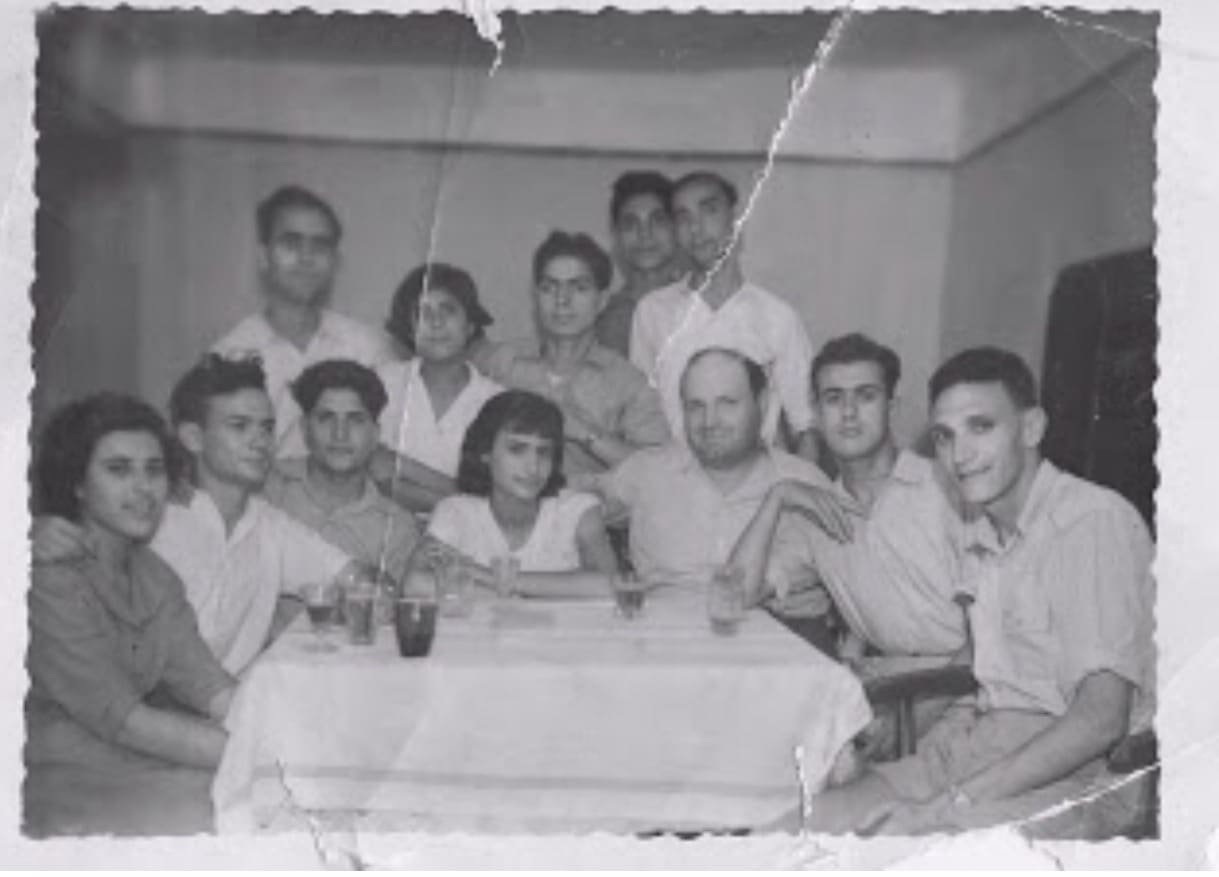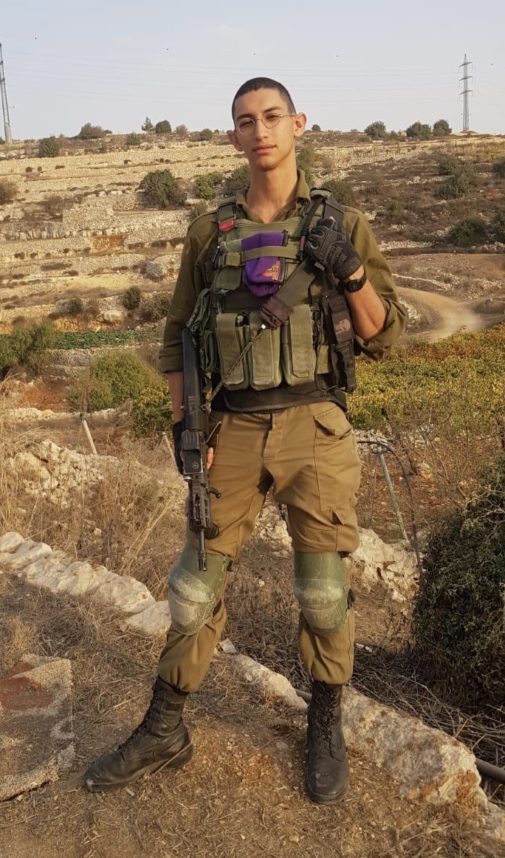 Nessim Bouskila, on the right; Photos courtesy of Tabby Refael
Nessim Bouskila, on the right; Photos courtesy of Tabby Refael On May 14, 1948, Nessim Bouskila, a 22-year-old Moroccan Jew living in France, was riding the Paris metro when he saw a man reading a special afternoon edition of France Soir. The front-page headline read, “L’etat d’Israël est ne” (“The state of Israel is born”). Overjoyed, he ran to a newsstand but his jubilation turned to dread when he read the subhead that appeared to bleed through the paper like a death sentence: “Egyptians announce ‘Our troops are entering the Holy Land.’ ”
The article also described how the Jewish Agency had issued a call for young Jews to help defend Israel. Bouskila immediately went to the organization’s Paris office. A few months later, he boarded a rickety boat bound for Israel. He didn’t tell his parents he was going to fight in Israel’s War of Independence until after he arrived. For Bouskila, protecting Jewish lives was a non-negotiable issue — one he’d learned while on the brink of death.
In 1940, Vichy France, which was aligned with Nazi Germany, began its two-year occupation of Morocco, and Bouskila was one of the teenagers tasked with going door-to-door in his hometown of Marrakech to collect the names of Jewish children slated for deportation to concentration camps. In November 1942, he and thousands of Moroccan Jews were saved when the Allies landed in North Africa during Operation Torch.
Bouskila served as a combat infantry soldier in the Palmach, the elite fighting force of the Haganah — the Jewish paramilitary operation that existed from 1920 to 1948. In October 1948, he fought in Operation Yoav, which helped Israel secure the Negev desert. During the operation, Israeli forces captured Metzudat Yoav (the Yoav fortress), which today serves as a museum and ceremony center for the Israel Defense Forces (IDF) elite Givati Infantry Brigade.
While he and thousands of Jews faced near-annihilation from five invading Arab armies during a war in which Israel lost almost 4,000 soldiers and 2,000 civilians (approximately 1% of its population), they still belonged to a romanticized era in the country’s history, immortalized by works such as Leon Uris’ 1958 novel “Exodus,” about the founding of the State of Israel.
Only one photograph exists of Nessim Bouskila during his service in Israel — with a group of Moroccan Jewish volunteers in 1948. In it, Bouskila exudes a quiet confidence. His smile seems to suggest he’s a grateful witness to a promise fulfilled — the 2,000-year-old promise of a return to the Jewish homeland.
On Feb. 5, 1985, Daniel Bouskila, a 21-year-old combat soldier in the Givati Brigade, was in a convoy searching for Hezbollah terrorists in southern Lebanon. As it passed the gates near a Palestinian refugee camp, a suicide bomber detonated an explosive device from a car. Ten of the 14 soldiers in Bouskila’s vehicle were injured. He and the remaining soldiers in the convoy spent the next 45 minutes in an exchange of gunfire.

The war zone was a far cry from Daniel’s upbringing in Los Angeles, where he attended YULA Boys High School. During the second semester of his senior year in 1982, he studied at a religious Zionist yeshiva in Israel. Six months later, the First Lebanon War broke out. Daniel was studying in the beit midrash when IDF jeeps and buses pulled up outside.
“Before my eyes, I watched the beit midrash, which had over 300 students and rabbis, empty down to about 25 of us, as all the students and many of the rabbis were also IDF combat soldiers, and they were being taken to the front lines,” he said.
Daniel never made it home to his high school graduation. Two years later, when he enlisted in the IDF, Israel was at war in southern Lebanon. “I knew with certainty that a big part of my service would take place there,” Daniel said. “I was not deterred by that. I was actually motivated by it.”
When his parents learned he was joining the IDF, they were “proud but anxious,” Daniel said. After all, his father, Nessim, was familiar with the meaningful but risky fight for the Jewish state.
In 1949, Nessim Bouskila returned to Paris and, in 1955, he married Alice Bitoun, an Algerian French Jew. A year later, they moved to Montreal, where their daughters, Sylvie and Orly, were born. They moved to L.A. in 1961 and Daniel was born in 1964. Nessim instilled in his children a sense of love and duty for the Jewish people.
“My primary inspiration to serve in the IDF was my father,” Daniel said. “I wanted to follow in his footsteps and be part of the story of Israel.” In 1993, Daniel received his rabbinic ordination from Yeshiva University.
In 2018, Ilan Bouskila was on a senior class trip in Poland when he visited MILA 18, the Jewish resistance command bunker at the Warsaw Ghetto, and sent his parents, Daniel and Peni, a text message, informing them he was delaying his college plans and enlisting in the IDF.

“There were moments in my service when I felt like I was drawing on the strength of my father and grandfather to keep myself going,” Ilan wrote in an email from Jerusalem. “I would imagine my grandfather in the desert and my dad in Lebanon. The two of them did their part despite all the hardship — that told me that I could, too.”
He continued, “I still love my friends from home, but sometimes it’s difficult to connect to them and their lives. Hearing about finals and parties while I was [in] the West Bank doing guard duty and patrols, or breaking up riots and doing house arrests at night, always made me feel like I was in a completely different world. It gave me a lot of perspective and insight [into] how the army changes people.”
Five months after his graduation from Shalhevet High School, Ilan, like his father, joined the Givati Brigade. He was placed in the elite Shaked battalion and was part of a front-line platoon that policed the West Bank. Ilan specialized in a weapon called “the Negev,” a machine gun with 800 rounds. He also was one of six soldiers selected to learn about and test new weapons yet to be released at the Rafael Advanced Defense Systems laboratory.
Long gone is the romanticized era of Nessim Bouskila’s Israel. That ended when Daniel served in Lebanon and Israelis began to see that war as their Vietnam. By the time Ilan enlisted, Israel had, for decades, been vilified on the world stage, including through delegitimization efforts such as the boycott, divestment and sanctions (BDS) movement.
In June 2019, Ilan stood at the Yoav fortress, where his grandfather once served, during a purple beret ceremony for the Givati Brigade. His father watched him from the stands and cried because he understood he was witness to three generations of men who have served the Jewish state.
Ilan also acknowledged his role in the tapestry of Jewish history. “It was momentous,” he said. “I felt like I was in a dream. Being there in that moment reaffirmed what I already knew; that I was part of something far bigger and more important than myself and my family; that there would always be more Jews ready to put our lives on the line for our people and future.”
Tabby Refael is a Los Angeles-based writer, speaker and activist.























 More news and opinions than at a Shabbat dinner, right in your inbox.
More news and opinions than at a Shabbat dinner, right in your inbox.